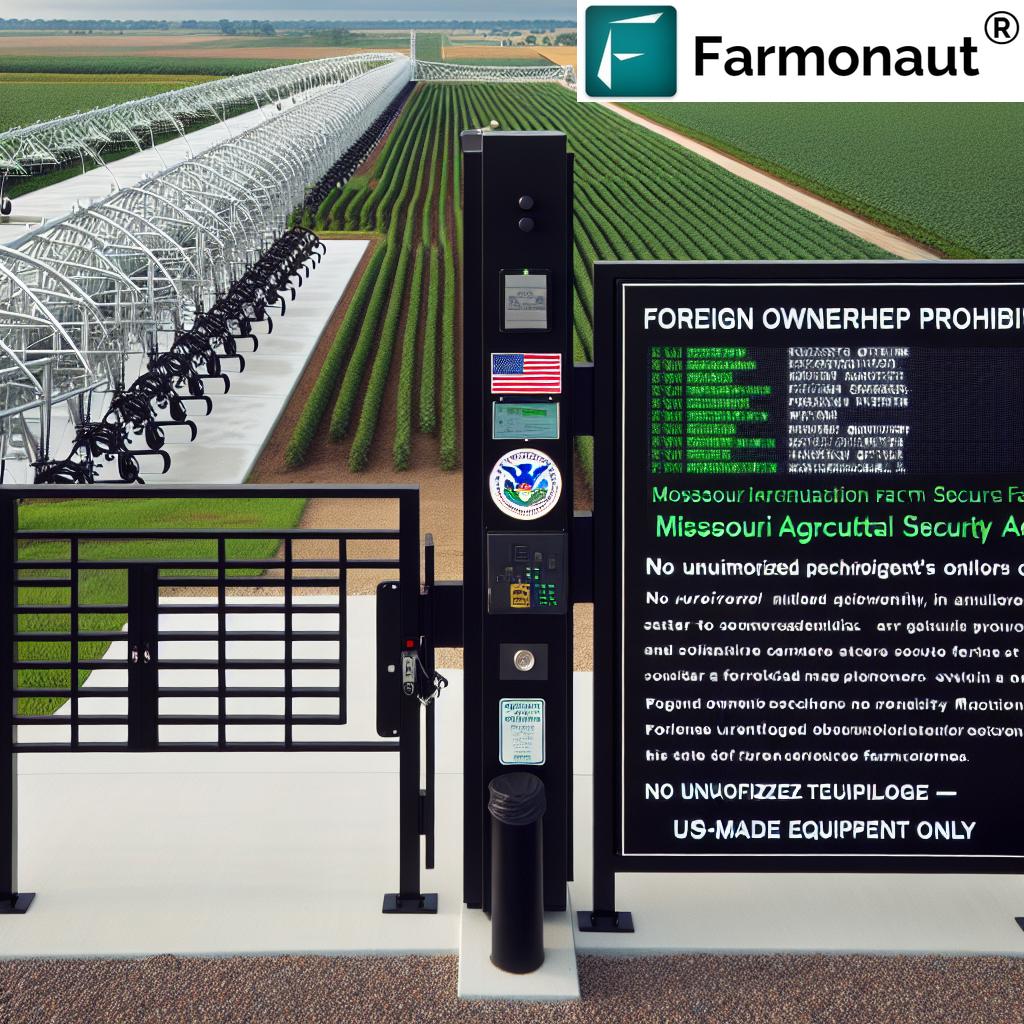Missouri’s New Frontier: Legislation Targets Foreign Farmland Ownership and Drone Security
“Missouri currently allows up to 1% foreign ownership of its farmland, a policy now under scrutiny.”
“Missouri currently allows up to 1% foreign ownership of its farmland, a policy now under scrutiny.”
In the heartland of America, Missouri is at the forefront of a significant shift in agricultural policy and national security measures. As we delve into this crucial topic, we’ll explore the proposed legislation that aims to reshape the landscape of foreign farmland ownership and drone regulations in the state. These developments are not just local concerns but reflect broader national trends in addressing potential threats to US agricultural land security and the risks associated with foreign technology.
The Current Landscape of Foreign Farmland Ownership in Missouri
To understand the magnitude of the proposed changes, we must first examine the current state of affairs in Missouri. The existing law, enacted in 2013, permits foreign entities to own up to 1% of Missouri’s agricultural land. This provision has allowed significant investments, including the acquisition of Smithfield Foods, Missouri’s largest pork operation, by a Chinese firm. The purchase included approximately 40,000 acres of Missouri farmland, highlighting the substantial impact of foreign ownership on the state’s agricultural sector.

As we analyze these developments, it’s crucial to consider the role of advanced agricultural technologies in modern farming practices. Farmonaut, a leading agricultural technology company, offers innovative solutions for farm management through its  that can assist farmers in navigating these changing landscapes.
that can assist farmers in navigating these changing landscapes.
Proposed Legislation: A New Era for Missouri Agriculture
The Missouri Senate is now considering groundbreaking legislation that could dramatically alter the state’s approach to foreign ownership of agricultural land. Senator Rusty Black, a farmer from Chillicothe, is spearheading efforts to implement a complete ban on future foreign land purchases. This proposal aims to enhance agricultural land security while allowing existing foreign-owned farms, such as Smithfield, to continue their operations under certain conditions.
- Complete ban on new foreign land purchases
- Existing foreign-owned farms allowed to continue operations
- Restrictions on transferring ownership to other foreign entities
The proposed legislation has garnered support from various farming organizations, recognizing the importance of preserving American control over agricultural resources. However, it’s not without opposition. The Missouri Realtors Association has voiced concerns, arguing against government intervention in private property rights.
Drone Regulations: A New Front in State Security
“A proposed bill in Missouri aims to ban aerial drones from two specific countries: China and Russia.”
“A proposed bill in Missouri aims to ban aerial drones from two specific countries: China and Russia.”
Concurrent with the farmland ownership discussions, Missouri lawmakers are taking aim at another potential security threat: foreign-made drones. House Bill 751 proposes to prohibit the sale of aerial drones manufactured in China or Russia within the state. This move is part of a broader effort to mitigate security risks associated with foreign technology, particularly from countries considered adversaries of the United States.
The growing use of drones in law enforcement has raised concerns about privacy and security, prompting scrutiny of the equipment used by police agencies. Currently, the Missouri State Highway Patrol operates 29 drone units, all manufactured in the U.S., but also possesses four Chinese-made DJI units that are not actively used.
As we consider the implications of these drone regulations, it’s worth noting that advanced agricultural technologies, such as those offered by Farmonaut through their  and
and  , can provide farmers with valuable insights without relying on potentially compromised foreign technology.
, can provide farmers with valuable insights without relying on potentially compromised foreign technology.
National Context and Security Concerns
The proposed legislation in Missouri is not occurring in isolation. It reflects a broader national trend of addressing potential threats from foreign technology, particularly from China and Russia. In 2019, Congress implemented a ban on the Pentagon purchasing drones and related components from China, highlighting the federal government’s concerns about foreign-made technology in sensitive areas.
The White House is also preparing regulations targeting drones and associated technology from these adversaries, underscoring the importance of this issue at the highest levels of government. These actions demonstrate the growing awareness of the potential risks associated with foreign technology in critical sectors such as agriculture and law enforcement.

Comparative Analysis: Current vs. Proposed Regulations
| Aspect | Current Law | Proposed Legislation |
|---|---|---|
| Foreign Ownership Limit | Up to 1% of Missouri farmland | Complete ban on new foreign purchases |
| Restrictions on Future Foreign Purchases | Limited restrictions | Strict prohibition on new foreign acquisitions |
| Drone Regulations | No specific restrictions on foreign-made drones | Ban on drones manufactured in China and Russia |
| Affected Countries | All foreign entities | Specific focus on China and Russia |
| Implementation Timeline | N/A | Proposed two-year phase-out for banned drones |
This table provides a clear comparison between the current regulations and the proposed changes, highlighting the significant shift in Missouri’s approach to foreign involvement in agriculture and technology.
Implications for Missouri’s Agricultural Landscape
The proposed legislation has far-reaching implications for Missouri’s agricultural sector. If enacted, it could significantly alter the ownership structure of farmland in the state, potentially leading to:
- Increased domestic ownership of agricultural land
- Changes in investment patterns in the agricultural sector
- Potential impacts on land values and agricultural production
These changes could reshape the economic landscape of rural Missouri, affecting everything from local farm operations to large-scale agribusinesses. As the agricultural sector adapts to these potential changes, farmers and landowners may need to rely more heavily on advanced technologies to maintain productivity and competitiveness.
In this evolving landscape, agricultural technology solutions like those offered by Farmonaut through their API and API Developer Docs can play a crucial role in helping farmers adapt to new regulations while optimizing their operations.
Impact on Law Enforcement and Public Safety
The proposed ban on drones manufactured in China and Russia would have significant implications for law enforcement agencies across Missouri. Local police departments currently using these drones would be required to phase them out within two years, necessitating a shift to alternative technologies.
This transition could lead to:
- Increased costs for law enforcement agencies to replace equipment
- Potential short-term gaps in aerial surveillance capabilities
- Opportunities for domestic drone manufacturers to fill the market void
While these changes may present challenges, they also offer an opportunity to enhance the security and reliability of law enforcement technology. By transitioning to domestically produced drones, agencies can mitigate potential security risks associated with foreign-made devices.
The Role of Technology in Adapting to New Regulations
As Missouri’s agricultural sector faces potential changes in land ownership and technological regulations, the role of advanced farming technologies becomes increasingly important. Farmers and agribusinesses will need to leverage innovative solutions to maintain productivity and competitiveness in this evolving landscape.
Farmonaut’s suite of agricultural technology solutions can play a crucial role in this adaptation process. By providing farmers with access to satellite-based crop monitoring, AI-driven advisory systems, and resource management tools, Farmonaut enables more efficient and data-driven farming practices.
These technologies can help farmers:
- Optimize resource usage and reduce waste
- Improve crop yields through data-driven decision making
- Enhance overall farm productivity and profitability
By embracing these technological advancements, Missouri’s agricultural sector can navigate the challenges posed by new regulations while continuing to thrive and innovate.
Economic Considerations and Future Outlook
The proposed legislation on foreign farmland ownership and drone regulations is likely to have significant economic implications for Missouri. While the primary aim is to enhance security and protect American interests, these changes could affect various sectors of the state’s economy:
- Agricultural Investment: Restrictions on foreign ownership may alter investment patterns in the agricultural sector, potentially impacting land values and access to capital.
- Technology Industry: The ban on certain foreign-made drones could stimulate domestic drone manufacturing and related technologies.
- International Trade Relations: These measures may influence Missouri’s trade relationships, particularly with countries affected by the new regulations.
As Missouri navigates these changes, it’s crucial for stakeholders across the agricultural and technology sectors to adapt and innovate. This is where solutions like those offered by Farmonaut can play a vital role in ensuring continued growth and efficiency in the face of new challenges.
Farmonaut: Empowering Farmers in Changing Times
As Missouri’s agricultural landscape evolves, farmers and agribusinesses need reliable tools to navigate these changes effectively. Farmonaut offers a comprehensive suite of agricultural technology solutions designed to enhance farm productivity, efficiency, and sustainability.
Key features of Farmonaut’s platform include:
- Satellite-Based Crop Health Monitoring: Real-time insights into vegetation health and soil moisture levels.
- AI-Driven Advisory System: Personalized farm management strategies based on data analysis.
- Resource Management Tools: Optimize the use of water, fertilizers, and other inputs.
- Blockchain-Based Traceability: Ensure transparency and security in agricultural supply chains.
By leveraging these advanced technologies, Missouri farmers can adapt to new regulations while improving their operations and maintaining competitiveness in the global market.
Earn With Farmonaut: Affiliate Program
Earn 20% recurring commission with Farmonaut’s affiliate program by sharing your promo code and helping farmers save 10%. Onboard 10 Elite farmers monthly to earn a minimum of $148,000 annually—start now and grow your income!
Conclusion: Navigating Missouri’s New Agricultural Frontier
As Missouri stands at the crossroads of significant legislative changes targeting foreign farmland ownership and drone security, the state is poised to enter a new era in agricultural policy and technology regulation. These proposed measures reflect broader national concerns about foreign influence in critical sectors and the potential security risks associated with foreign-made technology.
The outcomes of these legislative proposals will undoubtedly shape the future of Missouri’s agricultural landscape and law enforcement capabilities. While challenges lie ahead in implementing these changes, there are also opportunities for innovation, increased domestic investment, and enhanced security measures.
As the state navigates this transition, the role of advanced agricultural technologies becomes increasingly crucial. Solutions like those offered by Farmonaut can provide farmers and agribusinesses with the tools they need to thrive in this changing environment, ensuring that Missouri’s agricultural sector remains robust, efficient, and secure in the face of new challenges.
By embracing innovation and leveraging cutting-edge technologies, Missouri can set a precedent for other states in addressing these critical issues, potentially influencing national policies on agricultural land security and technology regulation. As we move forward, it will be essential to strike a balance between security concerns and the need for continued growth and innovation in the agricultural sector.
FAQ Section
- Q: What is the current law regarding foreign ownership of farmland in Missouri?
A: The current law, enacted in 2013, allows foreign entities to own up to 1% of Missouri’s agricultural land. - Q: What changes are proposed in the new legislation?
A: The proposed legislation aims to implement a complete ban on future foreign land purchases while allowing existing foreign-owned farms to continue operations under certain conditions. - Q: How will the proposed drone regulations affect law enforcement in Missouri?
A: The proposed bill would ban the sale of aerial drones manufactured in China or Russia, requiring local police departments to phase out these drones within two years. - Q: Why are these changes being considered?
A: These measures are being considered to enhance US agricultural land security and address potential security threats from foreign technology. - Q: How might these changes impact Missouri’s agricultural sector?
A: The changes could lead to increased domestic ownership of agricultural land, alterations in investment patterns, and potential impacts on land values and agricultural production.










